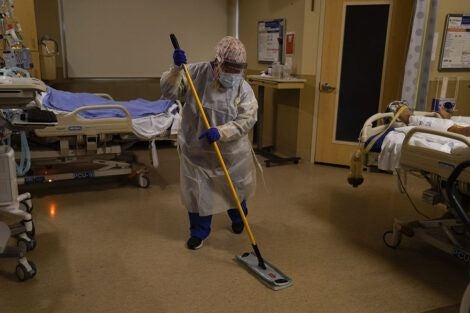October 27, 2021—Since 2007, the mission of the Center for Work, Health, & Well-being at Harvard T.H. Chan School of Public Health has been to identify and promote the workplace policies, programs, and practices that foster safe and healthy working conditions. In September, the National Institute for Occupational Safety and Health (NIOSH) supported these efforts by renewing the Center’s funding with a five-year, $6.9 million grant.
The COVID-19 pandemic has highlighted the unequal distribution of workplace health risks among workers of different races, occupations, and wage levels, which will be a critical focus of the Center’s work under the new grant.
“We are delighted to continue our essential research to benefit workers, especially those in industries that have been disproportionately impacted by the pandemic,” said the Center’s director and principal investigator Glorian Sorensen, research professor of social and behavioral sciences.
One of ten Centers of Excellence funded by NIOSH as part of the Total Worker Health® (TWH) initiative, the Center’s work is built around a conceptual model that identifies the many pathways through which conditions of work may influence health, safety, and well-being. A multi-disciplinary team of researchers focuses on generating and applying research evidence to advance policy and practice recommendations to improve working conditions; understanding contributors to work-related well-being and mental health; and identifying social and health disparities. Their efforts are organized into an outreach and dissemination core, a policy working group, and two current and two upcoming research studies.
Addressing workplace safety in hospitals, warehouse fulfillment centers
The Boston Hospital Workers Health Study draws on a longstanding partnership between the Center and Mass General Brigham. It aims to improve the health of the hospital’s workforce and to reduce health disparities among workers by identifying the roots of inequalities in the conditions of work. This study also looks at the potential impact of a range of workplace and public policies on worker health outcomes.
Another study is focusing on warehouse fulfillment centers, a major growth industry with a low-wage and racially diverse workforce. Researchers are recruiting teams of 10 to 14 workers and managers at multiple centers within one company to serve as health and well-being committees. These teams will solicit workers’ concerns regarding safety hazards and stressful work conditions and implement action plans to address them, creating a new channel for worker input.
Two more studies will be added in the coming years, one focused on the ways in which working conditions, policies, and other aspects of the workplace shape the extent to which workers thrive on the job, and another looking at the health and well-being of workers ages 50 and older, through analysis of six waves of data from the U.S. Health and Retirement Study.
In addition, researchers involved with the Center’s outreach core and policy working group are disseminating its research findings to employers and other stakeholders and helping them develop new practices and policies.
The Center has a number of partnerships and collaborative relationships, including with Boston College School of Social Work, Bouvé College of Health Sciences at Northeastern University, Mass General Brigham, Boston University, and HealthPartners, and has launched a new collaboration with MIT Sloan School of Management.
Photo: AP Photo/Jae C. Hong
